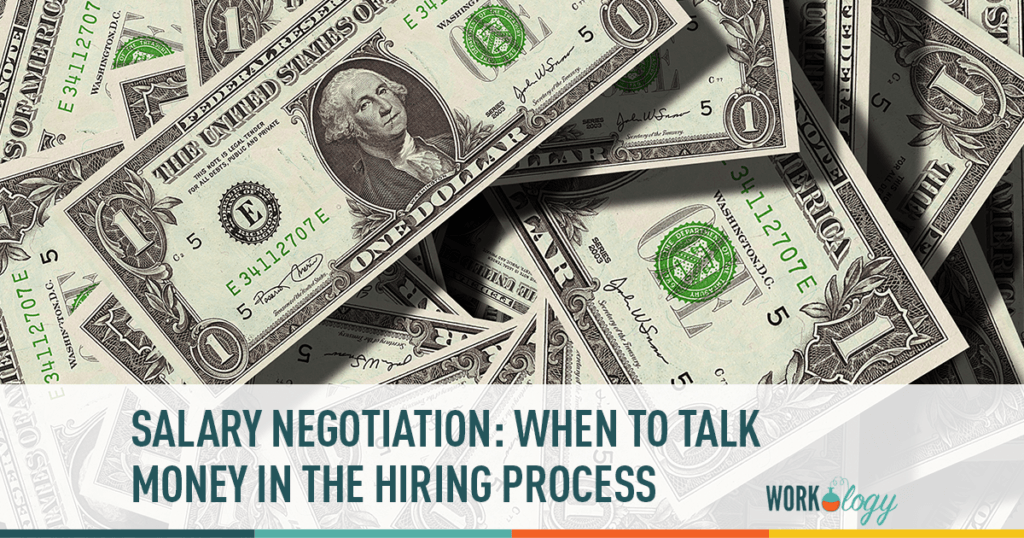It seems that the most mysterious part of the hiring process is salary. How do you approach salary negotiation? When do you bring up salary? How much should a candidate ask for? How to you navigate the seemingly endless number of salary negotiation tips from experts? Should an employer list salary on a job posting?
3 Salary Negotiation Tips
Conventional wisdom seems to be that it is best to hold off on talking about money until later in the hiring process for fear that either side will show its cards too soon. An article I recently read on The Ladders advises candidates to deflect if asked the salary question early in the process. I tend to be of the opposite mind. I prefer being open about salary from the beginning because it encourages an honest relationship with a potential employee from the beginning. It saves time for the recruiter, the hiring manager, and the potential employee.
The problem with salary negotiation
Part of the offer process involves figuring out how the candidate’s skills and experience match up with others who have done the job in order to determine where in the salary range they fall. It is assumed with many positions that there will be some salary negotiation in this phase of the process.
I am going to be honest here: I do not like negotiation. It always seems like a weird game where neither party really knows the rules. Reddit recently made headlines when CEO Ellen Pao announced they were doing away with salary negotiations. I really like this approach because it takes away the advantage that strong negotiators have. Not every job requires negotiation skills, so why do we penalize those who lack good negotiation skills when discussing salary? An offer should be based on skills relevant to a job, not on whether a candidate is skilled at the negotiation game.
Engaging in salary negotiation sets up a relationship of employer vs. candidate before the employment relationship has even begun. In salary negotiation, both sides try to be clever about how they present things, and there is often a sense that the other side has a trick up their sleeve. It is as though they are engaged in battle rather than getting ready to join forces. Perhaps my opinion goes against the grain, but I think it is time to reevaluate how we talk money in the workplace, and the hiring process is the first part of that.
Being straightforward about salary
For employers, I think it is a good practice to include salary range on a job posting. We spell out qualifications, expectations, company benefits, and other details about a job in the posting, so it makes sense to me to include information about salary from the first moment a potential candidate sees the job opening. We want to attract candidates who meet qualifications, fit within the company culture, and who also are within the salary range budgeted for the position.
It can be frustrating to go through phone screening, in-person interviews, and references, only to make an offer that the candidate refuses because it is much lower than what they expected. Having information about salary out in the open from the beginning can help prevent this.
When to talk about salary during the interview process
When I am on the recruiting end, I always like to bring salary up in the first phone call with the candidate. I have it on a list of basic screening questions that includes things like asking about availability and relevant skills. In the first conversation, I do not settle on a dollar amount, but I ask, “The range for this position is $10-14/hour. Does that fit with what you are looking for?” When a candidate hesitates to answer, I am upfront and let them know that I just want to make sure they are within range, so I do not waste their time if the company is unable to meet their salary needs.
For those of you that are job seekers, I encourage you to answer the question honestly. If the range is $10-14/hour, and you want at least $20/hour, it is unlikely the company will ever be able to meet your needs for that particular opening.
Once both the employer and candidate are clear on the range, you can set salary talk aside until the offer phase. I like this approach because it keeps money from being this mysterious thing hanging over the interview process.
What are your thoughts on discussing salary in the hiring process? How do you feel about companies that do away with salary negotiation?










2 Comments
Dear Stephanie,
This is a great article! The section that truly resonated with me and that I could identify with is that: “Not every job requires negotiation skills, so why do we penalize those who lack good negotiation skills when discussing salary? An offer should be based on skills relevant to a job, not on whether a candidate is skilled at the negotiation game.”
On that note, I do believe knowing your self worth is a very valuable notion to have. Having little self worth at one’s workplace could shorten their potential, resilience, relationships, etc. That being said, knowing your self worth would eliminate that having great negotiation skills isn’t the most critical factor in discussing one’s salary. One should be confident in their responsibilities and within their responsibilities their skills.
I had recently come across another blog that dissects the formula on fathoming and quantifying your value at your work place. This can be an extremely powerful tool when negotiating salaries. https://www.ivyexec.com/executive-insights/2015/knowing-your-worth-at-work/
Can’t wait to read more articles by you Stephanie.
Best,
Anonymous
Dear Stephanie,
Thank you for the great article and valuable information. I agree with you totally. The salary benchmarks should be defined upfront to ease out the uneasiness and it will save both parties valuable time as well.
Comments are closed.